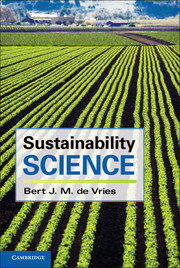Book contents
- Frontmatter
- Contents
- Preface
- 1 Introduction
- 2 The System Dynamics Perspective
- 3 In Search of Sustainability: Past Civilisations
- 4 The World in the Past 300 Years: The Great Acceleration
- 5 Sustainability: Concerns, Definitions, Indicators
- 6 Quality of Life: On Values, Knowledge and Worldviews
- 7 Energy Fundamentals
- 8 On Knowledge and Models
- 9 Land and Nature
- 10 Human Populations and Human Behaviour
- 11 Agro-Food Systems
- 12 Renewable Resources: Water, Fish and Forest
- 13 Non-Renewable Resources: The Industrial Economy
- 14 Towards a Sustainable Economy?
- 15 Outlook on Futures
- Glossary
- References
- Index
- Plate Section
- References
1 - Introduction
Published online by Cambridge University Press: 05 January 2013
- Frontmatter
- Contents
- Preface
- 1 Introduction
- 2 The System Dynamics Perspective
- 3 In Search of Sustainability: Past Civilisations
- 4 The World in the Past 300 Years: The Great Acceleration
- 5 Sustainability: Concerns, Definitions, Indicators
- 6 Quality of Life: On Values, Knowledge and Worldviews
- 7 Energy Fundamentals
- 8 On Knowledge and Models
- 9 Land and Nature
- 10 Human Populations and Human Behaviour
- 11 Agro-Food Systems
- 12 Renewable Resources: Water, Fish and Forest
- 13 Non-Renewable Resources: The Industrial Economy
- 14 Towards a Sustainable Economy?
- 15 Outlook on Futures
- Glossary
- References
- Index
- Plate Section
- References
Summary
Roots
When you open a newspaper, any newspaper, there is a big chance you will encounter the term sustainable development. Introduced to a broader public in the 1980s with the publication of the UN's report Our Common Future, sustainable development has become common vocabulary. The word ‘development’ is commonly used to indicate growth, not only in quantity, but primarily in quality. The word ‘sustainable’ refers to something that can or should last. The idea of sustainable development reflects one of the leading aspirations of humankind in the 21st century, not unlike the idea of socialism in the early 20th century. It has become a modern equivalent of, and complement to, the Declaration of Human Rights, formulated shortly after the devastating Second World War. Civil society organisations have pushed sustainable development forward; respected business and government leaders now hail it as the foremost challenge for the 21st century.
Inevitably, such an aspiration or ideal accommodates a large variety of explanations, objectives and proposals. These are intertwined with personal and collective values and perceptions, which are in turn rooted in millennia of developments shaping human experiences, knowledge, technical skills and social arrangements. Given the human population's continous growth and its use of the planet as a source of resources and a sink of waste, humanity needs an ongoing dialogue that slowly converges to a widely shared vision on the theory and practise of sustainable development.
- Type
- Chapter
- Information
- Sustainability Science , pp. 1 - 13Publisher: Cambridge University PressPrint publication year: 2012



